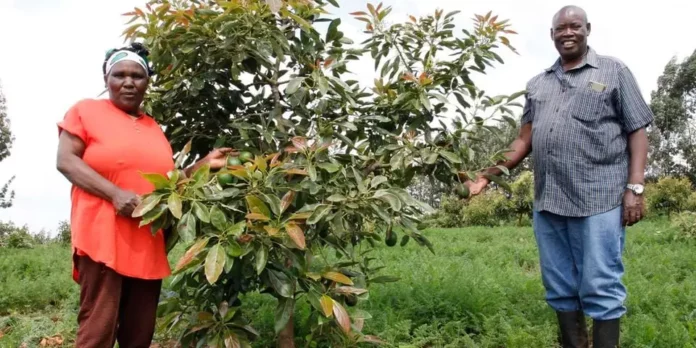Due to their zeal for avocado farming, Fredrick Chege and his wife, Mary Njeri, have gained popularity in Elburgon, Nakuru County. As you approach his home at a distance, the ten-acre forest of Hass Avocado fruit trees captures the attention of the eye.
The farm, named Nyakiambi, hosts some 1,500 hass avocado trees at various growth stages. Chege narrates how his farming journey began way back in 2019.
Joyce Kamau: How I made Sh. 4 million in two years selling avocados
He sourced 1,200 certified Hass avocado seedlings from a nursery. However, water was a problem in the region, and nearly all his seedlings dried up. This did not dampen his spirit as he went ahead to secure more seedlings to replace the 900 that had dried up.
Recalling he spent Ksh 230,000 on the venture, he was so determined his project would yield good results.
Chege says the reason why he chose the Hass variety is because of the excellent market price as compared to Fuertes. Further, the Hass variety does not require much maintenance while in the field.
“The good thing with hass avocado is that once planted, the trees do not need greater maintenance, especially when it comes to inputs like fertiliser,” says Chege.
He said that he spaces the trees at 15ft by 15ft to ensure good growth. Further, he intercrops fruits with leguminous crops such as beans since they contain nitrogen. Nitrogen has a vital role in the growth and development of avocado trees. To make the fruits healthier, the couple manures, waters, and top dress the trees with Calcium Ammonium Nitrogen.
How to invest in the rich avocado export business
Expressing lots of satisfaction, Chege said during their first harvest, they obtained 20,000 fruits from their 10-acre farm. Depending on size and traders, they sold each fruit at between Ksh 10-20.
“This was a good beginning, and I am optimistic that one tree may produce up to 400 fruits in the second harvest in December. Farmers can harvest two to three times per year depending on the season, especially when rainfall is sufficient,” he said.
Chege mastered the secrets leading to better earnings. According to him, he deals with buyers directly on the farm. He plans to start selling the fruits to companies that make products like butter.
The couple is also working on drilling a borehole and erecting water tanks on the farm to curb the persisting effects of drought.









